- Home
- Kristin Harmel
The Room on Rue Amélie Page 11
The Room on Rue Amélie Read online
Page 11
Charlotte suspected that her neighbor felt more alone than ever now; after all, she really had no one to turn to. Ruby rarely went out anymore, except to pick up her rations, and Charlotte had never seen her have a visitor.
Charlotte was still seeing Ruby once a week for English lessons—her parents were very firm on that—and while she tried to ask how Ruby was doing, most of their conversations were only about schoolwork and mundane details of daily life. Charlotte had tried to raise the subject of the British pilot more than once, for she wondered and worried about what had happened to him, but Ruby always cut her off. “You never know who’s listening,” she would whisper. “We mustn’t speak of these things aloud, Charlotte.”
But Charlotte was tired of avoiding what was obviously the defining moment of their friendship, and so on one early autumn night, she made a decision after dinner. She would go and let Ruby know that she could be trusted and that she wasn’t scared of the Nazis.
She had her hand on the door to her apartment, ready to step out into the hall, when she heard a noise that startled her. She peered through the peephole just in time to see a broad-shouldered, dark-haired man lurching toward Ruby’s door. He knocked loudly, and Charlotte, suddenly paralyzed by doubt, held her breath. Was he another Nazi? Was he there to hurt Ruby? But as he knocked again, harder this time, Charlotte realized he was dressed in ill-fitting clothes caked with dirt and grime. Certainly no German soldier would wander around Paris looking like that. But he wasn’t wearing a pilot’s uniform either. So who was he?
Ruby’s door finally opened a crack.
“Excuse me,” the man said in French with an accent that sounded familiar. Where had Charlotte heard it before? “I’m just coming from the north. My wife has died, and I’m looking for her cousin. I’m sorry, but I don’t know his name. I only know that he lives in this building and walks with a limp.”
Ruby regarded him in silence, and in that sliver of quiet, a realization hit Charlotte: His accent was the same as that of the pilot she and Ruby had hidden in August. She was almost certain of it. But why was he telling such a ridiculous story? She peered back out the peephole just in time to see Ruby’s expression. She looked confused, but not scared.
“A man with a limp, you say?” Ruby asked carefully, and the man nodded, although he was already backing away.
“Perhaps I have the wrong apartment. I’m very sorry,” he was saying, but there was something about his voice that sounded strange now. His words were melting together, and he sounded suddenly weak. He seemed to rock back and forth on his feet, and then he fell to his knees with a great crash and appeared to waver there for a moment. “Very sorry,” he said, but this time, his words were in English, and then he toppled forward, passing out cold in Ruby’s doorway.
CHAPTER SIXTEEN
October 1941
Three facts were immediately clear to Ruby. First, the man before her was British. Second, he had come in search of Marcel, which probably meant he was a pilot in need of help. Third, she needed to get him out of the hall immediately, before the concierge or someone else saw him. As if to underscore her thoughts, the door to the Dachers’ apartment cracked open, and Charlotte peeked out.
“Ruby?” she whispered.
“Go back inside!” Ruby hissed. “I don’t want you involved in this!”
Charlotte looked as if Ruby had slapped her. “But I can help.”
“No. Please. Forget you saw anything.”
Without waiting for a reply, Ruby bent and grabbed the man under his arms, dragging his limp body into her apartment. She locked the door behind her and turned to look at him. He was large and handsome, but in a boyish sort of way. Not like the previous pilot, and not like Marcel. Or was it just that he looked innocent because he was fast asleep? She crouched down beside him, noting his pink cheeks, and placed a hand on his forehead. He was burning up.
He moaned softly, but he didn’t wake, and after a moment, she made a decision. She knew she should hide him in the hall closet as she’d done with Dexter, but he needed her help immediately. She had to get his fever down before she could figure out what to do next.
She wanted to put him on the couch so that he’d be more comfortable, but he was too heavy to lift. So she settled for leaving him where he was and bringing in the pillow and blanket from her own bed. She ran cold water into a basin and spent the next two hours beside him, holding a wet cloth to his forehead and frequently dipping it back in the water to keep it cold. He stirred a few times and murmured unintelligibly, but it wasn’t until nearly midnight that his eyes finally opened.
He focused on her with difficulty, his pupils dilating. Then he gasped and tried to sit up. “Where am I?” he asked in English, his voice weak. His eyelids fluttered and he shook his head. “I’m sorry,” he said, switching to French. “I meant to ask where I am.”
“You’re in an apartment in Paris,” she replied in English. “You’re safe for the time being. You have a fever, though, and we need to take care of it.”
“You speak English?” He looked at her in awe.
She nodded. “I’m American. And you are British?”
He hesitated, searching her face. His eyes, she noticed, were an almost translucent blue, like nothing she had ever seen. She knew he was trying to figure out whether he could trust her.
“My husband helped people like you,” she said after the silence had dragged on for more than a minute.
“Your husband?”
“Yes.” Ruby wondered if she was imagining the shadow of disappointment that crossed his face.
“He’s here too?”
“Not right now. But I want to help you. You must tell me who you are, though.”
Again he paused, his eyes locked on hers.
She could read his thoughts. “This isn’t a trap,” she said gently. “You’ve been asleep for more than two hours. If I’d wanted to hurt you—or to call the authorities—I would have done so already.”
His eyes stayed on hers for a moment more, and she found herself once again thinking that they were an extraordinary color. “My name is Thomas, miss,” he said at last. “Thomas Clarke. I’m an RAF pilot. My plane went down near Arras, and I’ve been walking for days. My friend Harry was helped by a man in this building several months ago. It was the only place I knew to go. Did you know Harry?”
Ruby shook her head. “My husband kept his work to himself.”
“Your husband, he walks with a limp?”
“Yes.”
“He’s the man Harry told me about.” His eyelids fluttered again, and Ruby could see his head bobbing a bit.
“Stay with me.”
“I think I’m quite ill.”
She smiled. “Yes, that’s a safe guess. I’m just trying to figure out whether you’re sick because you’ve been out in the elements for a few days, or if something more serious is wrong.”
“Something more serious?”
“Like an infection. Were you hurt when your plane went down? Any wounds?”
He looked at her blankly. “I hurt my ankle, but it’s not bleeding. And I might have a few scrapes on my chest.”
“May I see?”
He paused, then unbuttoned his shirt slowly. His chest was muscular and taut, and just below the left side of his rib cage was an open gash at least two inches wide. It was yellowed and oozing. It didn’t look right at all.
“Is there something there?” he asked weakly, trying to sit up.
“There’s just a small cut.” She placed a firm hand on his right shoulder. “I need to clean and dress it. It may hurt a little. Let’s get you to the bed, shall we?”
He looked uncertain. “The bed? But where will you sleep? And what about your husband?”
“Don’t worry. You need your rest right now more than I do. May I help you up?”
He nodded, leaning into her for support as he pulled himself shakily to his feet. She noted, as she helped him limp toward the bedroom, that her head didn’t quite reach his
shoulder; he was several inches taller than Marcel had been, and he was even more broadly built than she’d first noticed.
“Please, miss,” he said as she settled him on the edge of her bed. “I don’t want to be an inconvenience.”
“You’re not,” she said firmly. “Now lie down, and I’ll get some supplies to dress your wound.”
“Miss?” he asked weakly as she headed for the doorway.
She turned. “Yes?”
“You haven’t told me your name.”
“It’s Ruby.”
“Ruby,” he repeated, and there was something about the way her name sounded in his mouth that made her heart race. “Thank you, Ruby. Thank you for helping me.”
“You’re welcome, Thomas,” she replied after a moment, but he was already asleep, his chest rising and falling with each shallow, shuddering breath.
THOMAS FLINCHED BUT DIDN’T AWAKEN as Ruby cleaned out his wound. And over the next two days, she tended to him as best she could, feeding him broth and then stale bread when he was able to keep food down. She wished she had more to share, but what she did give him seemed to help, and by the third night, his forehead was no longer burning, and some color had returned to his cheeks.
“I’m feeling much better,” he told her as she brought him a small dinner of bread and weak coffee. “I should probably get out of your bed now. I’m embarrassed that I took it for so long.”
“Don’t be silly. You’ve been sick. I’m just glad you’re on the mend.”
“Surely my being here is putting you in danger.”
Ruby avoided meeting his gaze. “You just focus on getting your strength back.”
“You’re an angel, you know that?” he said as she handed him a small glass of water. He drank it down gratefully. “An absolute angel, Ruby.”
She could feel herself blushing. “You remembered my name. I thought you might not; you were delirious when you got here.”
His eyelids were already growing heavy. “I can’t imagine forgetting a single thing about you.”
He drifted back to sleep before she could muster a response. And finally, for the first time in days, Ruby was sure that he would live, so she allowed herself to lie down on the floor beside the bed and close her eyes, just for a moment.
When she awoke, the first rays of dawn were streaming through the window, which meant she’d been asleep all night. She gasped and sat up, only to realize that the pilot was lying on his side, gazing down at her. “You’re awake,” he said. “I hope it’s not out of line for me to say that you’re beautiful when you sleep.”
She hid an embarrassed smile. “I’m very sorry. I didn’t mean to nod off.”
“And I didn’t mean to take over your life like this. I’m mortified that I let you sleep on the floor. I’m terribly sorry.”
“You weren’t in any condition to argue.” She stood and put a hand on his forehead. It was cool, the fever entirely gone. She breathed a sigh of relief. “I think you’ve turned a corner, Thomas.”
“You saved my life.”
“Oh, you would have been fine with or without me.”
He chuckled. He had a nice laugh, warm and strong. “Don’t for a minute believe I’m going to indulge your modesty. You’re a regular Florence Nightingale.”
She could feel her cheeks burning again, and she quickly changed the subject. “You said when you arrived that your friend had been here?”
“Yes, miss. Harry Cormack. He described your building exactly. But I was expecting to find your husband when I got here, not you.” He hesitated. “May I ask a personal question? Your husband . . . He’s not here anymore, is he?”
“What makes you say that?” She hadn’t told him that Marcel was dead, because she figured that it would be better if a strange man staying in her apartment had the idea that her husband could come home at any moment. But aside from his sheer size, there was nothing threatening about Thomas at all. He seemed kind and gentle, and his question appeared to come from a place of concern.
“I don’t see anything that looks like it belongs to him in your room. Am I wrong?”
“No.” Maybe she should have felt like he’d invaded her privacy, but he’d merely been observant. “He died a few months ago.”
“I’m terribly sorry. You must miss him.”
“Things between us weren’t very good at the end.” She couldn’t believe she’d just admitted that; she couldn’t explain why she’d said it. “But yes. His death was very sad. I missed him more than I expected at first.”
“And now you’re alone,” he said softly, his eyes on hers.
“Well, yes.” She felt suddenly flustered. “But I’m perfectly all right. Now let’s get you changed into some clean clothes.”
AFTER THOMAS HAD FALLEN BACK asleep, this time on the sofa, Ruby left a note saying she was going out. It didn’t feel wise to leave him alone in the apartment, but she was confident he was smart enough to hide or to climb out through the terrace if someone appeared at her door while she wasn’t there.
She walked quickly to the bakery on the rue de la Comète, the one Aubert had mentioned, keeping her head down the whole way. She was certain he would chide her for sheltering a pilot in an apartment the Nazis were already aware of, but she knew she’d made the right choice. If she had tried to move Thomas, he surely would have died. That his fever had broken and he was on the mend was nothing short of a miracle. Now, she needed another one.
As she waited in the queue at the bakery, she found herself thinking more than she should have been about the pilot. Not about her mission to save him—for that was to be expected—but about the way his presence filled her apartment. The way it had made her heartbeat quicken when she came into her room and saw him asleep in her bed. It was silly, of course, surely an indication that she’d been lonelier than she realized. But the truth was, it was something more than that, something she couldn’t quite put her finger on.
It took her an hour to reach the front counter. “I’m looking for Aubert Moreau,” she said to the middle-aged woman with the beak nose who was standing there handing out loaves of bread.
“Never heard of him,” the woman snapped. “Ration card, please.”
“No, I know he’s here,” Ruby protested. “Or at least he was.”
“There is no one by that name here.”
“Please,” Ruby said, softening her tone as the woman looked past her, already focusing on the next customer. “I’m Marcel Benoit’s wife.”
The woman’s eyes snapped back to Ruby. “I have no idea who that is. But I suppose that if someone named Moreau dropped by, I could give him a message for you.”
Ruby regarded her warily. “There’s no message. Please just tell him I hoped to see him.”
“Yes, of course. Now, would you like some bread?”
Ruby realized she’d forgotten her ration card, but the woman pressed a loaf into her hand anyhow, holding her gaze for a beat too long. Either Ruby had just left word for Aubert that she needed help, or she had alerted the authorities to the fact that they should check out her apartment once again.
Thomas was awake and out of bed when she returned. She was surprised to find him standing in the living room, looking at some of her framed photographs. “I was starting to worry about you,” he said, smiling at her.
She took in the sight of him before responding. He was dressed in a pair of Marcel’s pants—far too tight and short on him—and one of Marcel’s old shirts, which looked like it was about to burst at the seams. He had washed his hair and he’d shaved, which made him look somehow more vulnerable too. He touched his cheeks self-consciously as she continued to stare. “I’m sorry,” he said. “I found a razor in the bathroom. I hope you don’t mind that I used it. I’m not accustomed to having a beard.”
“No, no, it’s fine,” Ruby said, tearing her eyes away.
“Is everything all right? You were gone for a while.”
Ruby nodded. “I was just trying to reach a man my husband w
orked with on the escape line. But I couldn’t find him.”
“I don’t mean to be a burden, miss.”
“First of all, you’re not a burden.” Ruby realized as she said the words just how true they were. “And second, you must stop calling me miss. How about just calling me Ruby?”
He laughed. “I’m sorry. Ruby it is.” He turned and gestured to one of the photos he’d been looking at when she came in. It was a snapshot of her when she was around fifteen, standing amid the poppies that bloomed each spring near her parents’ house in California. “This is you as a girl.” It was a statement, not a question. “You were happy.”
She looked up in surprise. Visitors to the apartment were often drawn to the picture, but they always commented on the vast field of flowers. Never on her. “Yes, I was.”
“Do you mind me asking why you haven’t gone back to the States?”
Ruby gestured to the couch, and they both sat down. “I suppose because I chose to make my world here. At first it was because I’d made a promise to my husband, but then I fell in love with Paris. And you can’t just love something when it’s easy, can you? That’s not real love.”
“Indeed.” Thomas was staring at her in a way that made her feel both unsettled and understood.
She drew a deep breath and went on. “I’m glad I stayed. Maybe that sounds crazy, but in America, there would be nothing I could do to help. Here, at least I can do something.”
“But it’s risky. Especially doing what you’re doing, Ruby. Hiding people like me.”
She gave him a small smile. “You’re the first, actually. Since my husband died.”
He stood up abruptly. “Why didn’t you tell me? I just thought this was something you were already involved in. I should go; I can’t put you in this sort of danger.”
She reached instinctively for his hand to pull him back down beside her. She realized only after his fingers closed around hers that it had been too forward of her, but suddenly, she didn’t want to let go—especially when it became clear that he had no intention of releasing her either. His hand was large, callused, and warm. “Please, Thomas, sit down.”

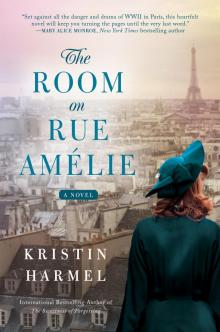 The Room on Rue Amélie
The Room on Rue Amélie The Winemaker's Wife
The Winemaker's Wife The Forest of Vanishing Stars
The Forest of Vanishing Stars The Book of Lost Names
The Book of Lost Names Italian for Beginners
Italian for Beginners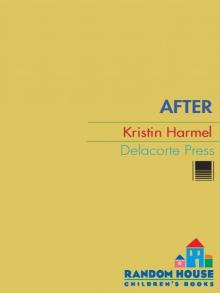 After
After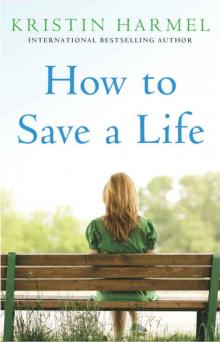 How to Save a Life
How to Save a Life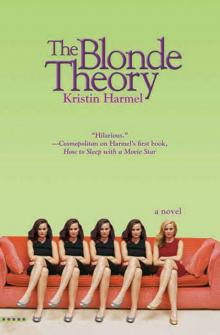 The Blonde Theory
The Blonde Theory The Sweetness of Forgetting
The Sweetness of Forgetting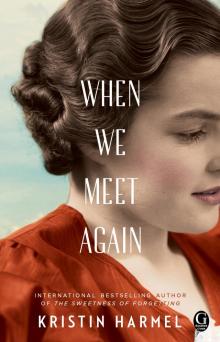 When We Meet Again
When We Meet Again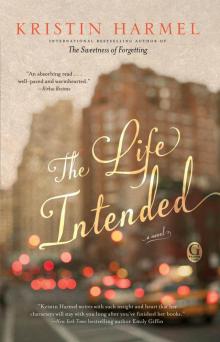 Life Intended (9781476754178)
Life Intended (9781476754178)